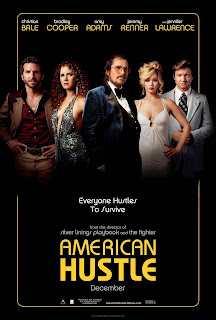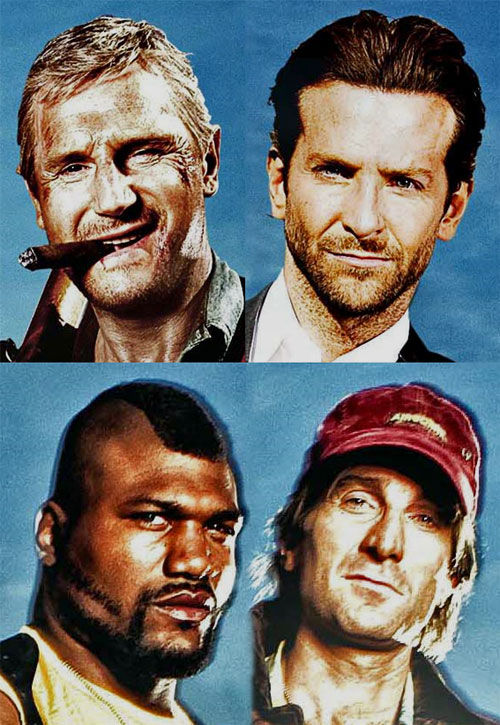Oh, no, we're starting to overrate David O. Russell!
Don't get me wrong, I think Russell has put together a solid career, especially these past few years.
The Fighter is one of my favorite modern sports movies, and while I contend that the mental health topic was just a smokescreen for an otherwise-predictable romantic comedy in
Silver Linings Playbook, it was still a well-made, exceptionally-acted motion picture. And so when this man pumps out a movie, it's fairly easy to drum up audiences, even when your trailers reveal none of the plot and thrive on catchy pop tunes. He's gotten to that pedestal that all directors hope to achieve, where their name holds more allure than many of the all-star cast that people are actually going to be staring at for over two hours. And all in all, he's deserved it, getting excellent performances from talented casts and piecing together a strong filmography. So it's a surprise to no-one that
American Hustle has gotten so much praise from critics, and that audiences have been solidly filling theaters to see it. There's just one problem... the movie's not really all that great.
 |
| If you grew up in the 80's, you knew this guy. |
The movie is a fictionalized retelling of the FBI's ABSCAM investigation that saw several US politicians convicted of corruption charges from the late 70's to the early 80's, saying that "Some of this actually happened" but also changing all the names and details involved. So right off the bat we have a problem. Yes, last year we had an historical drama that changed many a detail for the purpose of telling a good story in
Argo. But while Ben Affleck might have fudged a few lines in adapting his Best Picture winner, he was still determined to tell stories about real people faced with impossible odds. It didn't matter that not everything in the movie matched up with its real world counterpart, because at the end of the day Affleck was representing these folks as truly as he knew how. Russell meanwhile uses such an important moment in US history as ABSCAM as a mere baseline for his own simple morality play (which he rewrote from a screenplay by
The International's Eric Singer), and doesn't really seem care about the event's historical significance, or how it relates to the story he wants to tell.
 |
| Okay, guys, you can play patty-cake later. |
The film also stutters through an opening act told almost entirely in voice-over monologues. Even if you can accept this clear breach of "show but don't tell" (at which movies of this level are
SUPPOSED to excel) as a quick and easy method of introducing our leads, there's no real excuse for not settling on one voice; the narration starts from the perspective of small-time conman Irving Rosenfeld (Christian Bale), which makes sense, because he's the protagonist of the story. But Russell quietly ushers in a change by adding in the disembodied voice of Amy Adams (playing Irving's business partner and mistress Sydney Prosser) for no discernible reason other than to make fun of the main character's comb-over. What's painful is that the scenes are actually so well-shot, and these actors so evocative despite lacking dialogue, that the scenes really do speak for themselves, making the voice-overs completely unnecessary. It's almost as if the director dumbed-down these scenes in an attempt to create a more audience-friendly atmosphere. That's not something you want to see from a man who was never concerned with mainstream success in the past.
 |
| Just... wow. |
Fortunately, most of the succeeding acts are much better compiled, as they focuses on what makes David O. Russell movies so revered: the interplay between characters. The relationships between each pair of personalities are so well-constructed and believable that they
MAKE American Hustle as entertaining as it is. For instance, many sides of Irving can be seen through his interactions with others, from his tempered fury for FBI handler Richie DiMaso (Bradley Cooper), to the genuine (and conflicted) friendship he develops with well-meaning corrupt politician Carmine Polito (Jeremy Renner), to his poisonous relationship with young wife Rosalyn (Jennifer Lawrence). Each character has a litany of such relationships to one another, and one of the film's true pleasures comes from seeing those emotional turmoils move the story forward from scene to scene. The actors have great chemistry, and it ups the payoff that is delivered, even when their actions are quite so noble as to be respected in that way.
 |
| There's a fetish for that. |
It's a shame that the individual performances couldn't have been more consistent. Now, Bale is absolutely great, carrying the movie with an unusual combination of charm, honesty and a little bit of sleaziness to sell the con man angle. He's obviously deeply invested in this character, and it shows, as he proves once again to be among the best actors in Hollywood today. But even he is upstaged by his ladies,
American Hustle's true stars. Adams has a rich, meaty role that she wholeheartedly throws herself into. Her sensual performance and easy chemistry with her costars makes for a lot of fun to watch, and she steals about half the scenes in the flick. Most of the others are stolen by Lawrence, who puts on one of the year's best performances despite being given material similar to Kat Dennings in
Thor: The Dark World. Despite a role that feels largely written for laughs, Lawrence handily floors the audience with excellent comedic timing, an intense, believable on-screen presence, and more sheer talent than most career artists achieve in their lifetime. Both of these women deserve Oscar nods this year, despite the crowded Supporting Actress field; there might be a riot if even one of them fails to garner a nomination.
 |
| These scenes - and these ladies - are out of this world. |
I just wish more of the cast had stepped up as those three. Cooper's FBI agent is so over the top, though to be fair he certainly was written that way, what with the completely forced love triangle and the prototypical interfering mother and a feud with his boss that in the real world would never be tolerated. But even then Cooper goes way over the top, over-exaggerating every syllable and becoming even more of a caricature. Worse off is Renner, whose script choices have not allowed him to approach the potential he showed in
The Hurt Locker and
The Town. Here he's barely used, and when he is the dialogue is so rote as to work against him. And yes, I know many of the scenes were ad-libbed, but those moments were infinitely better than those that were plainly scripted. Beyond the big five are a cavalcade of side characters, one-note parts given
WAY too much material to justify their collective presence while wasting the considerable talents of the actors brought in to play them. It's this kind of lazy character development that sabotages much of the good the actors try to bring to the screen, and keeps the movie from ultimately reaching the zenith it ought to have.
 |
| Obligatory cast shot. |
I feel like I've been saying this a lot in 2013 (and as I write this, it still
IS 2013... Happy New Year!), but
American Hustle just isn't as good as we expect it to be. It's still
GOOD, but you have to navigate a messy story, hit-or-miss character development, and - perhaps its worst sin - a poor, heavy handed ending that comes out of left field and negates many of the "true story" ideas. Here, David O. Russell is a director not at his best, though he at least still has some of the year's best performances under his guidance. Maybe this is part of an inevitable decline from greatness, or perhaps it's simply a slight downturn and his next picture turns into one of the best of all time. But while there's an interesting ABSCAM story out there begging to be told, it's not this one; because it's not really
ABOUT the event. There was another director this year who took a "true" story, created a fictionalized narrative around it, changed everything that didn't work or might be controversial, threw in a solid cast and tried to take a humorous approach to it. Who was that again... oh, right, it was Michael Bay. And when your movie can find more apples-to-apples comparisons to
Pain & Gain than it can to
Argo, you've definitely got some problems.

















































